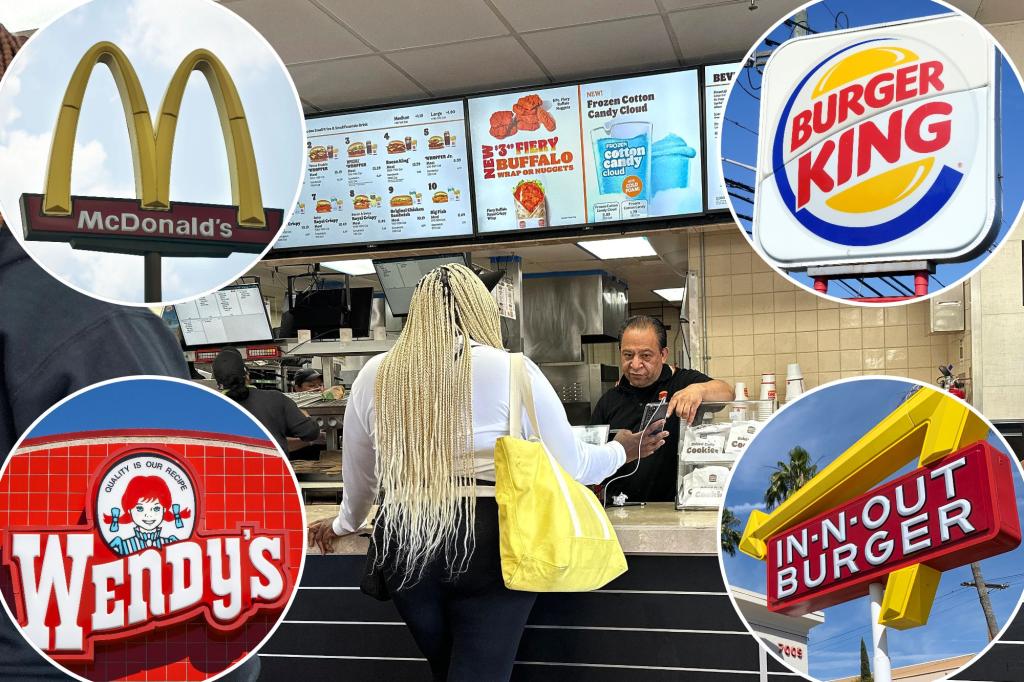California’s new $20-an-hour minimum wage law for fast-food workers reduced visits to popular chains as restaurants like McDonald’s, Wendy’s and Burger King raised prices to offset higher costs, according to a study.
California’s new $20-an-hour minimum wage law for fast-food workers led to higher prices and lower traffic at popular chains including McDonald’s, Wendy’s and Burger King, according to a study.
Since the new law took effect on April 1, foot traffic at Burger King fell 3.86%, while Wendy’s fell 3.24% and McDonald’s fell 2.5%, according to a report from analytics firm Placer.ai.
In-N-Out Burger, the popular fast-food chain that also recently raised menu prices on key items to cover increased labor costs, saw 2.59% fewer customers, while Jack in the Box visits fell 0.8%.
“It’s early, but we’re starting to see the ripple effect of the minimum wage increase on the broader restaurant industry,” RJ Hottovy, head of analytics research at Placer.ai, wrote in the report.
The law — which raised the minimum wage for fast-food workers from $16 an hour to $20 — was also blamed for forcing companies like Rubio’s Coastal Grill to close dozens of locations across the state.
Rubio’s, which filed for Chapter 11 bankruptcy protection last week, cited “significant increases in California’s minimum wage” as the reason for the closings.
Another fast food restaurant, Fosters Freeze, recently closed a location near Fresno, saying the franchise owner could no longer afford to pay workers the improved wages.
In the six-month period leading up to the new law, fast-food prices in California rose an average of 7% — forcing franchisees in the state to cut hours, postpone capital improvements and accelerate the deployment of automation features as myself. – kiosk service.
Placer.ai’s report found that casual dining chains can benefit from traffic erosion at fast food restaurants.
Olive Garden and Chili’s locations in California have seen an increase in visits that have exceeded the national average since the minimum wage law went into effect, according to the report.
Between February and March of this year, Olive Garden saw a 1% increase in customer visits across California.
Since the minimum wage increase law went into effect, the figure jumped to 1.88%, according to Placer.ai.
Chili’s saw a 3.6% drop in visits across California in February and March.
But in the eight weeks spanning April and May, it saw a 0.19% increase in visits, the report found.
Casual chains like Chili’s and Buffalo Wild Wings have tried to lure customers with value meals, such as the latter’s Monday and Wednesday all-you-can-eat wings promotion, which has so far proved successful.
Fast food companies have warned that rising labor costs will be passed on to consumers in the form of higher menu prices.
In Los Angeles County, a double burger combo at In-N-Out now goes for $11.44 — an increase of $0.76 from last year, KTLA reported.
At San Francisco’s tourism-heavy Fisherman’s Wharf, a double-double burger with fries and a drink costs $13.63 after tax.
Less hungry customers will still have to pay $7.50 for the double wrap without sides or drinks, KRON4 reported.
A report published earlier this year by Kalinowski Equity Research found that fast-food chains such as Wendy’s, Chipotle, Starbucks and Taco Bell raised their menu prices by up to 8% in preparation for the new tax law taking effect. minimum wage.
According to the report, Wendy’s raised its menu prices by about 8%, while Chipotle Mexican Grill raised its prices by about 7.5%.
Starbucks, the Seattle-based coffee chain, raised prices on menu items at its California locations by about 7%, while Taco Bell raised its prices by 3%.

